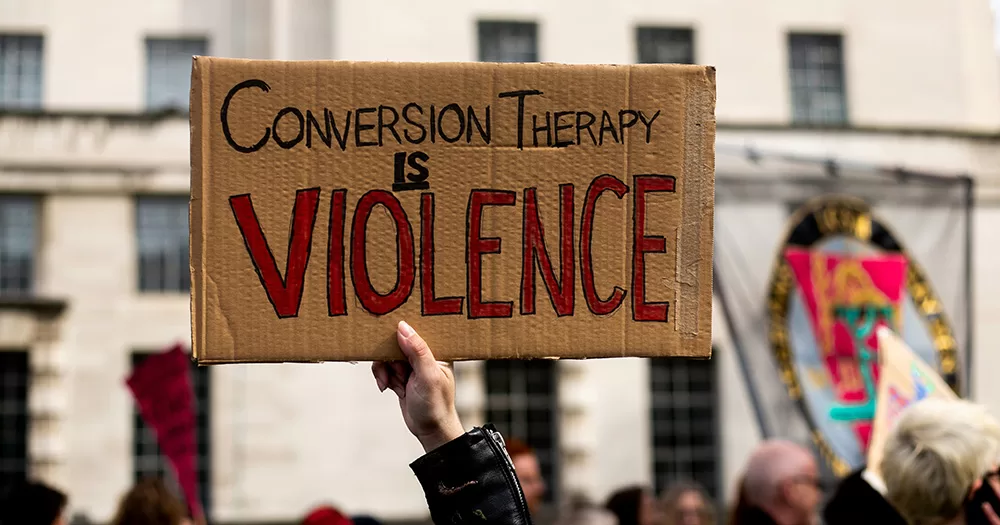Content warning: Discussion of so-called ‘conversion therapy’ and its consequences
On January 16, the Irish government published its Legislation Programme for Spring 2024, listing the bill to ban so-called ‘conversion therapy’ as a priority for publication.
The drafting of the legislation is the first step towards the Bill being enacted, thus criminalising conversion therapy practices in Ireland. Once the proposal is published, it will undergo different stages of deliberation and then be submitted to a vote in both houses of the Oireachtas.
As of today, the Bill’s proposals are still being discussed. In response to a Parliamentary question from Labour leader Ivana Bacik on January 17, Minister Roderic O’Gorman stated: “Intensive work on drafting the General Scheme is ongoing and officials continue to engage with the Office of the Attorney General on the matter. It is planned that legislative proposals will be brought forward shortly.”
The National LGBT Federation (NXF) welcomed the news on social media and also called for the Hate Crime Bill to be enacted this term.
Good to see long awaited ban on so-called ‘conversion therapy’ & updating of equality acts among priority Bills for publication during this parliamentary session.
We also need to see Hate Crime Bill enacted this term.@dcediy @rodericogorman #Dail https://t.co/3cuF2oQRg5
— NXF (@nxfie) January 17, 2024
The Bill to ban conversion therapy was first introduced to the Irish Cabinet by Roderic O’Gorman in June 2023. It aims at banning practices seeking to change or suppress an individual’s sexuality or gender identity expression. The practice is said to deepen internalised homophobia and transphobia, particularly by associating heterosexuality and normativity with “success”, and can be conducted through psychotherapy, medical or faith-based approaches.
As established by research led by Trinity College Dublin and the Department of Children, Equality, Disability, Integration and Youth, conversion therapy indeed exists in Ireland and is harmful and damaging to LGBTQ+ individuals. The report also underlines the need for precise policies and accurate legislation to avoid any legal loopholes, to properly protect queer individuals.
Minister O’Gorman echoed that concern on January 18: “Given the complex and sensitive nature of the proposed legislation, my Department is carefully considering the key policy principles that will underpin the legislation to ensure that individuals are protected from these harmful conversion practices while the necessary and appropriate services for those with concerns in areas of sexual orientation and gender identity are not affected.”
Studies on the subject were already driven by the United Nations and the European Union in 2020 and 2022, respectively. Their conclusions were similar to the ones made by Trinity. The heavy consequences for individuals being confronted with conversion practices have been reported to result in self-hatred, shame and guilt, going as far as post-traumatic stress and suicidal thoughts.
In Ireland’s case, the Trinity study shows that those practices were mainly led in strong religious contexts, involving certified practitioners. Thus, the report advocates for legislative actions based on professional contexts, such as licensed psychiatrists or faith-based therapists. Since LGBTQ+ youth is under the Mental Health Act (2001), individuals under 18 don’t have a right to reject therapy if their parents consent to it. Therefore, activists stress that the soon-to-be proposed bill needs to take those contexts into account.
Such an initiative is essential to ensure Irish queers’ safety, especially for LGBTQ+ youth. As legislative work takes time, the Bill is still under conception and the proposals will hopefully be soon published and updated. The latter represents a big step for Ireland, as other European countries, such as Malta, Germany, France, and Greece, already have national bans on the damaging practice.
© 2024 GCN (Gay Community News). All rights reserved.
Support GCN
GCN is a free, vital resource for Ireland’s LGBTQ+ community since 1988.
GCN is a trading name of National LGBT Federation CLG, a registered charity - Charity Number: 20034580.
GCN relies on the generous support of the community and allies to sustain the crucial work that we do. Producing GCN is costly, and, in an industry which has been hugely impacted by rising costs, we need your support to help sustain and grow this vital resource.
Supporting GCN for as little as €1.99 per month will help us continue our work as Ireland’s free, independent LGBTQ+ media.
